How L-Theanine Can Help You Stay Calm in Social Situations
🌍 Introduction: The Hidden Struggle of Social Anxiety
Imagine standing in a crowded room, heart racing, palms sweaty, mind looping with anxious thoughts. For many, this is the reality of social anxiety. Even casual interactions—ordering at a café, meeting new people, or speaking in a group—can feel overwhelming.
While lifestyle strategies like therapy, mindfulness, and breathwork are essential, research increasingly points to certain natural supplements as allies for calming the brain. One that stands out is L-theanine, an amino acid found almost exclusively in tea leaves 🍵. Known for its gentle but profound calming effects, L-theanine supports mental clarity without drowsiness—making it ideal for situations where anxiety spikes but alertness is still needed.
This article explores the science behind L-theanine, how it affects brain chemistry, and how you can combine it with other holistic approaches to ease social anxiety and feel more confident in your daily interactions.
Looking for supplements for people with Social Anxiety? Click here.
🧠 What Is L-Theanine?

L-theanine is a non-protein amino acid most commonly found in green tea (Camellia sinensis). It was first identified in the 1940s and has been studied for its unique ability to influence neurotransmitters and brain waves in ways that reduce stress and anxiety while enhancing focus.
Unlike prescription medications, L-theanine works subtly:
- It doesn’t sedate you like benzodiazepines.
- It doesn’t overstimulate you like caffeine.
- Instead, it balances brain activity, making you feel calm yet alert—a perfect state for social interactions.
🔬 The Science: How L-Theanine Affects the Brain
🌸 Boosts GABA, Serotonin, and Dopamine
L-theanine increases levels of neurotransmitters that regulate mood and relaxation:
GABA 🌙: Calms overexcited neurons, reducing nervous tension.
Serotonin 🌸: Enhances mood stability and emotional regulation.
Dopamine ⚡: Supports motivation and reward, countering avoidance behaviors.
📉 Reduces Cortisol and Stress Hormones
When social anxiety strikes, your body floods with cortisol (the stress hormone). L-theanine has been shown to lower cortisol levels, which can prevent the cascade of physical symptoms like a racing heart ❤️🔥 or trembling hands.
📡 Increases Alpha Brain Waves
Perhaps the most fascinating effect of L-theanine is its ability to increase alpha brain waves—the same relaxed, alert state achieved through meditation 🧘. Alpha waves promote clarity, creativity, and calm focus, which makes social interactions feel less threatening.
😰 Social Anxiety vs. Everyday Nervousness
It’s important to distinguish between shyness or normal nerves and social anxiety disorder (SAD).
- Shyness = occasional discomfort, but doesn’t stop you from living your life.
- Social Anxiety Disorder = persistent fear, avoidance, and physical symptoms that interfere with daily functioning.
L-theanine may help with both, but for those with severe social anxiety, it should be used alongside professional support, not as a replacement.
🍵 Why L-Theanine Works So Well for Social Anxiety
- It takes the edge off without dulling your mind.
- It pairs well with caffeine (many people enjoy green tea or matcha for a calm-alert effect).
- It has few side effects compared to conventional medications.
- It can be taken before social situations to make them more manageable.
Unlike alcohol, which many socially anxious individuals rely on, L-theanine doesn’t impair judgment or create dependency. It’s a tool that supports natural brain chemistry instead of overriding it.
🌿 Supplements: How to Use L-Theanine Safely
✅ Dosage
Common effective doses range from 100–400 mg per day.
For calming social anxiety, many people find 200 mg before an event helpful.
🕒 Timing
Effects begin within 30–60 minutes.
Can be taken daily for ongoing calm or as-needed for stressful situations.
☕ With or Without Caffeine?
With caffeine: Increases focus while reducing jitteriness. Great for work or presentations.
Without caffeine: Pure relaxation without stimulation.
⚠️ Safety
L-theanine is generally safe, but:
- Pregnant or breastfeeding women should consult a doctor.
- Those on blood pressure medication should monitor levels.
Looking for supplements for people with Social Anxiety? Click here.
🌬️ Breathwork + L-Theanine = Double Calm

While supplements can provide a foundation, breathwork adds an immediate layer of calm.
Want to try Breathwork? Click Here.
Box Breathing (4-4-4-4) ⬛
Inhale 4 → Hold 4 → Exhale 4 → Hold 4.
Great before walking into a meeting.
Extended Exhale 🌬️
Inhale 4 → Exhale 6–8.
Triggers the vagus nerve, signaling safety.
Resonance Breathing 🎶
Inhale 5 → Exhale 5.
Balances the nervous system for ongoing calm.
Together, L-theanine and breathwork create a synergistic calm-alert state, perfect for navigating social interactions.
🧑⚕️ Therapy and Mental Wellness Support
While supplements like L-theanine are powerful tools, social anxiety is best addressed with a multi-layered approach.
Cognitive Behavioral Therapy (CBT) 🧠: Helps reframe anxious thought patterns.
Exposure Therapy 🚶: Gradually reduces fear by facing social situations.
Group Therapy 🫂: Provides safe practice for interactions.
Mindfulness and Meditation 🧘: Strengthens calm focus over time.
Supplements + breathwork + therapy = comprehensive care.
Looking for online therapy for people with Social Anxiety? Click here.
🥗 Lifestyle Choices That Support L-Theanine’s Effects
Nutrition: Eat magnesium-rich foods (spinach, pumpkin seeds) and omega-3s (salmon, chia seeds).
Sleep: Prioritize 7–9 hours; poor sleep worsens social anxiety.
Exercise: Even a 20-minute walk can lower anxiety levels.
Limit Alcohol and Caffeine: Relying on alcohol worsens long-term anxiety, while excess caffeine counteracts calm.
🌱 Other Supplements That Pair Well with L-Theanine
Magnesium 🌿: Relaxes muscles, improves sleep.
Ashwagandha 🌸: Adaptogen that reduces cortisol.
Omega-3 Fatty Acids 🐟: Support brain health and mood.
GABA Supplements 🌙: Direct calming effect (though bioavailability is debated).
Looking for supplements for people with Social Anxiety? Click here.
📊 What the Research Says
Several studies have demonstrated L-theanine’s role in reducing stress and anxiety:
- A 2016 study showed that 200 mg of L-theanine significantly reduced stress in participants exposed to stressful tasks.
- EEG scans confirm increased alpha brain waves within 40 minutes of supplementation.
- Clinical research suggests L-theanine can be especially effective when combined with caffeine or magnesium.
🌟 Real-Life Scenarios: L-Theanine in Action
Before a Job Interview 👔: Taking 200 mg helps reduce racing thoughts and sweaty palms.
During Social Gatherings 🎉: Keeps the mind calm without feeling sedated.
For Students 📚: Supports focus during presentations or group discussions.
💡 Practical Tips for Using L-Theanine
Start with 100–200 mg and see how your body responds.
Take it 30–60 minutes before a social event.
Pair it with breathwork for maximum calm.
Keep it consistent if you deal with daily anxiety.
🎯 Conclusion: Calm Confidence, Naturally
Social anxiety can feel paralyzing, but tools like L-theanine offer a natural way to rebalance your brain chemistry, reduce physical symptoms, and create space for confidence to grow. Combined with breathwork, therapy, and supportive lifestyle habits, L-theanine can help you approach social situations with calm, clarity, and courage.
👉 Whether you’re preparing for a big meeting, attending a party, or simply wanting to feel more at ease day-to-day, L-theanine is a gentle yet powerful ally in your mental wellness toolkit. 🌿🍵
📖 References
Nobre, A. C., Rao, A., & Owen, G. N. (2008). L-theanine, a natural constituent in tea, and its effect on mental state. Asia Pacific Journal of Clinical Nutrition.
Unno, K., et al. (2016). Stress-reducing function of green tea. Nutrients.
Hidese, S., et al. (2017). Effects of chronic L-theanine administration on stress-related symptoms and cognitive functions. Nutritional Neuroscience.
Kimura, K., et al. (2007). L-theanine reduces psychological and physiological stress responses. Biological Psychology.
Nathan, P. J., et al. (2006). The neuropharmacology of L-theanine. Journal of Herbal Pharmacotherapy.
Related Posts
-

Nootropics That Promote Calm and Rest
Explore the world of calming nootropics — natural brain enhancers that promote relaxation, better focus, and deeper rest. Learn how L-Theanine, magnesium, ashwagandha, and other adaptogens help balance your nervous system, reduce stress, and support restorative sleep.
-

Best Natural Supplement Stack for Sleep
Discover the best natural supplement stack for deep, restorative sleep. Learn how nutrients like magnesium, L-theanine, glycine, and calming herbs such as chamomile and ashwagandha work together to relax your body, calm your mind, and improve sleep quality—naturally and safely.
-

Combining L-Theanine and Magnesium for Sleep: A Calm Night, Naturally
Discover how combining L-Theanine and Magnesium can help you drift into deep, restorative sleep. Learn how this natural duo calms the mind, relaxes the body, and supports your nervous system—without grogginess the next morning.
-

How to Sleep Better After Intense Workouts
Struggling to fall asleep after a tough workout? Learn how to optimize your post-training recovery with nutrition, hydration, and science-backed sleep strategies. Discover how to calm your nervous system, balance hormones, and wake up fully recharged for your next session.
-

Ashwagandha and Valerian: A Bedtime Combo for Deep Rest and Emotional Reset
Discover the calming synergy of Ashwagandha and Valerian root, two natural sleep aids that help quiet the mind, ease anxiety, and promote deeper rest. Learn how this herbal duo supports the nervous system, balances stress hormones, and restores emotional peace — without next-day grogginess.
-

How to Create a Resilience-Boosting Diet
Discover how to build emotional and physical strength from the inside out with a resilience-boosting diet 🍎. Learn which foods stabilize your mood, how supplements like magnesium and omega-3s strengthen your stress response, and why pairing nutrition with breathwork and therapy creates lasting calm, focus, and vitality 🌿💪.
-

Best Teas and Herbal Blends for Calmness: Nature’s Way to Restore Inner Peace
Ashwagandha, the ancient adaptogenic herb, helps your body find balance during stress. Known as “Indian ginseng,” it supports cortisol regulation, boosts energy, and restores calm clarity. Discover how this powerful root promotes resilience, emotional balance, and steady vitality — one cup at a time. 🌸
-

Parenting and Emotional Strength: How to Raise Children Without Losing Yourself
Empathy is the bridge that connects hearts — the quiet power to understand, feel, and support another’s emotions without judgment. Learn how empathy strengthens relationships, enhances communication, and cultivates deeper compassion in everyday life. 🌿
-

How to Bounce Back from Public Failure: Reclaiming Confidence, Purpose, and Power
Visualization is more than imagination — it’s brain training for resilience. By picturing calm, success, or healing, you activate the same neural pathways as real experience. Learn how daily visualization rewires your brain for confidence, emotional balance, and recovery from stress. ✨
-

Coping with Financial Stress Through Resilience: How to Stay Grounded When Money Feels Tight
Body awareness is the foundation of emotional resilience. By tuning into your body’s signals — tension, fatigue, or calm — you learn to recognize stress before it overwhelms you. Discover how mindfulness, gentle movement, and breathwork can deepen your connection with your body and restore balance from the inside out. 🧘
-

How to Stay Positive During Chronic Illness: A Guide to Emotional Strength and Hope
Creativity is more than art — it’s a form of healing. Whether through painting, writing, music, or small acts of expression, creativity helps release emotion, calm the nervous system, and reconnect you to joy. Discover how to use creativity as a tool for emotional balance, resilience, and self-discovery. 🌿
-

Resilience Tips for Caregivers: How to Stay Strong While Caring for Others
Joy isn’t the absence of pain — it’s the quiet strength to find light even in challenging times. Cultivating joy through small daily moments restores balance, releases stress, and reminds you of life’s beauty. Learn how to reconnect with authentic happiness, rebuild emotional energy, and nurture your nervous system through gratitude, presence, and play. 🌿
-

Building Resilience After a Breakup: How to Heal, Rebuild, and Rise Stronger
Social connection is one of the strongest predictors of emotional resilience. During difficult times, genuine relationships act as anchors — calming the nervous system, reducing stress hormones, and helping you regain perspective. Learn how cultivating real human connection can strengthen your mind, heart, and overall well-being. 🌿
-

How to Stay Emotionally Strong During Job Loss
Your emotions are powered by brain chemistry — a delicate balance of neurotransmitters like serotonin, dopamine, and cortisol. When these chemicals work in harmony, you feel calm, focused, and resilient. Learn how daily habits, nutrition, and mindfulness can support your brain chemistry and boost emotional well-being naturally. 🌿
-

The Role of Hormones in Emotional Stability: How Your Chemistry Shapes Your Calm
Hormones shape more than your body — they shape your emotions, resilience, and sense of calm. From cortisol to serotonin, these chemical messengers influence how you react to stress, connect with others, and recover from challenges. Learn how to balance your hormones naturally to build lasting emotional stability and harmony within. 💫
-

Mitochondria and Emotional Energy: The Cellular Power Behind Your Mood
Breathwork is one of the most powerful tools for emotional regulation and cellular balance. Through intentional breathing, you can calm your nervous system, increase oxygen flow to the brain, and even support mitochondrial energy. Learn how conscious breathing connects body and mind — transforming stress into presence and emotional strength. 🌿
-

Inflammation and Its Impact on Mood Resilience: The Silent Link Between Body and Mind
Inflammation doesn’t just affect the body — it impacts the mind. Chronic inflammation alters brain chemistry, depletes serotonin, and makes emotional recovery harder. Learn how calming inflammation through nutrition, mindfulness, and sleep can restore balance, resilience, and a renewed sense of emotional strength. 💫
-

How Antioxidants Protect Emotional Well-being: The Hidden Link Between Oxidative Stress and Mental Health
Antioxidants do more than protect your body — they defend your mind. By neutralizing oxidative stress, antioxidants support serotonin, dopamine, and brain energy pathways that keep you calm, focused, and emotionally balanced. Discover how foods like berries, green tea, and dark chocolate nourish your brain, boost mood, and strengthen resilience from the inside out. 🌿✨
-

The HPA Axis and Emotional Health: The Hidden Bridge Between Stress and Mind
Neuroplasticity — the brain’s ability to rewire and adapt — is the foundation of emotional healing and resilience. When you face stress, trauma, or change, your neural pathways can reshape themselves to support new patterns of calm, focus, and self-awareness. Learn how daily practices like mindfulness, therapy, and breathwork strengthen neuroplasticity to transform emotional pain into personal growth. 🌸
-

Why Cortisol Control Is Key to Resilience: Mastering Stress to Build Emotional Strength
Controlling cortisol — the body’s main stress hormone — is the secret to lasting resilience. When cortisol levels stay balanced, your mind becomes clearer, emotions steadier, and energy more sustainable. Learn how breathwork, mindset shifts, adaptogens, and daily rhythms can help you calm your stress response and build true inner strength. 🌞💪
-

Dopamine’s Influence on Motivation and Recovery: Reigniting Drive and Balance
Healthy relationships are the foundation of emotional balance and resilience. Whether romantic, familial, or platonic, genuine connection releases dopamine, serotonin, and oxytocin — the brain’s “bonding trio” — helping us feel secure, motivated, and seen. Learn how trust, empathy, and communication not only strengthen your connections but also reshape your nervous system for deeper emotional well-being. 🌿🤝
-

The Role of Serotonin in Resilience: How This “Mood Molecule” Shapes Emotional Strength
Serotonin — often called the “resilience molecule” — plays a vital role in how we handle stress, regulate mood, and recover from emotional challenges. Beyond happiness, this powerful neurotransmitter helps balance the gut-brain axis, stabilize the nervous system, and support emotional flexibility. Learn how nutrition, sunlight, mindfulness, and adaptogens can naturally boost serotonin and strengthen your emotional resilience. 🌞🧠
-

How Neuroplasticity Supports Emotional Growth: Rewiring the Brain for Resilience
Neuroplasticity is the brain’s built-in power to grow, adapt, and heal — and it’s the foundation of emotional transformation. Every mindful breath, compassionate act, or reframed thought strengthens new neural pathways that support resilience and self-awareness. Learn how your brain rewires through daily habits, helping you turn emotional challenges into opportunities for growth and calm. 🌿
-

Tai Chi and Adaptogens for Mind-Body Balance: The Art of Harmonizing Energy and Resilience
Alchemy isn’t just an ancient science — it’s a timeless symbol of transformation and inner balance. By blending the physical and spiritual, alchemy teaches us that change begins from within. Just as metals are refined into gold, we too can transmute emotional pain, stress, and chaos into clarity and strength through mindful practice and self-awareness. 🌙✨
-

Cold Therapy and Emotional Control: Training the Mind Through the Body
Cold therapy isn’t just for athletes — it’s a tool for emotional mastery. By exposing your body to controlled cold, you train your nervous system to stay calm under stress, improving focus, mood, and resilience. This article explores the science of cold exposure, its impact on hormones and the vagus nerve, and how ice baths and cold showers can help you build emotional control, one breath at a time. 🧊🧘♂️
-

How Music Influences Emotional Recovery: The Healing Soundtrack of the Mind
Neuroplasticity — the brain’s ability to rewire and heal itself — is at the heart of emotional recovery. Through mindful habits, music, therapy, and consistent mental stimulation, your brain can form new connections that support resilience and well-being. Discover how neuroplasticity turns pain into growth, helping you rebuild balance, focus, and emotional strength. 🌿
-

Nature Therapy for Building Resilience: Reconnecting With the Healing Power of the Earth
Nature therapy helps rebuild emotional resilience by reconnecting you with the healing rhythms of the Earth. From forest walks to sunlight exposure, nature restores balance to your nervous system, lowers stress hormones, and teaches emotional adaptability. Learn how spending time outdoors can enhance mental clarity, calm anxiety, and awaken your natural capacity to heal. 🌞
-

Breathwork Techniques That Pair with Supplements: The Ultimate Synergy for Stress Relief and Mental Clarity
Breathwork and supplements create a powerful mind-body synergy for stress relief, focus, and energy. By combining intentional breathing with adaptogens, nootropics, and calming nutrients, you can naturally regulate cortisol, sharpen mental clarity, and boost emotional balance. This guide explores the best breathwork techniques and supplement pairings to help you feel centered, calm, and energized from the inside out. 🌿
-

Why Cortisol Balance Matters for Emotional Strength
Balancing cortisol — your body’s main stress hormone — is essential for emotional resilience. When cortisol is chronically high, your mind stays stuck in survival mode, leading to fatigue, anxiety, and emotional instability. This article explores how nutrition, supplements, breathwork, and therapy can help restore healthy cortisol rhythms, regulate the nervous system, and strengthen your ability to handle life’s challenges with calm focus and emotional strength. 🌿
-

Best Supplements for Students During Exam Season: Focus, Energy, and Memory Support
Studying late into the night? Learn which natural supplements can boost focus, memory, and mental stamina during exam season — without the crash. From omega-3s to Bacopa and Rhodiola, discover your brain’s ultimate exam support stack. 🎓🧠
-

Natural Memory Boosters for Seniors: How to Keep Your Mind Sharp and Focused
Stay mentally sharp and confident as you age. Discover science-backed natural supplements and lifestyle habits that boost memory, focus, and brain longevity for seniors. 🌿🧠
-

The Link Between Stress, Cortisol, and Memory Loss
Chronic stress can quietly erode your memory — and cortisol is the key culprit. Learn how stress hormones affect the brain, why the hippocampus shrinks under pressure, and how natural strategies can help you restore memory and mental clarity. 🧠✨
-

How to Build a Daily Supplement Routine for Memory Health
Want to sharpen your memory and stay mentally clear? Learn how to build a daily supplement routine for memory health — from morning focus to nighttime brain repair. Discover science-backed nutrients that boost recall, focus, and long-term cognitive resilience. 🧠🌿
-

Top 5 Natural Supplements for Memory Recall and Focus
Looking to boost memory and concentration naturally? Discover the top 5 supplements — Bacopa, Ginkgo Biloba, Lion’s Mane, Rhodiola, and Phosphatidylserine — that enhance focus, recall, and long-term brain health. 🧠✨
-

Top Supplements to Balance Mood Naturally
From omega-3s to adaptogens, discover the top natural supplements proven to support emotional balance, reduce stress, and promote inner calm — safely and effectively. 🌿✨
-
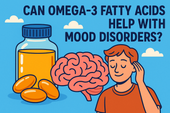
Can Omega-3 Fatty Acids Help with Mood Disorders?
Omega-3 fatty acids do more than support heart health — they can help balance mood, reduce depression, and calm anxiety. Discover how EPA and DHA nourish your brain, fight inflammation, and support emotional well-being from within. 🌊🧠
-

Vitamin D and Mood: The Sunshine Vitamin for Emotional Balance
Could the key to emotional balance be as simple as a little sunlight? Discover how vitamin D — the sunshine vitamin — influences serotonin, reduces inflammation, and helps you feel more positive and resilient year-round. ☀️💛
-

The Role of Magnesium in Reducing Irritability and Low Mood
Feeling on edge or emotionally drained? Magnesium could be the missing link between your body and your mood. Discover how this essential mineral reduces irritability, balances neurotransmitters, and helps your nervous system find calm again. 🌿✨
-
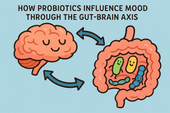
How Probiotics Influence Mood Through the Gut-Brain Axis
Discover how probiotics can do more than support your digestion—they can actually uplift your mood. This article explores the fascinating gut-brain axis and how balancing your gut bacteria through probiotics may help reduce anxiety, improve emotional stability, and support long-term mental well-being. 🌿🧠
-
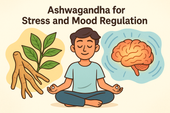
Ashwagandha for Stress and Mood Regulation
Discover how Ashwagandha, the powerful adaptogenic herb 🌿, helps your body manage stress and regulate mood. Learn how it balances cortisol, boosts GABA and serotonin, and supports emotional stability — helping you feel calm, focused, and resilient every day.
-
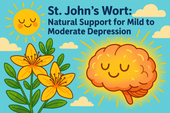
St. John’s Wort: Natural Support for Mild to Moderate Depression
Discover how St. John’s Wort, the “sunshine herb” 🌼, naturally supports mild to moderate depression. Learn how it boosts serotonin, balances mood, and promotes emotional resilience — with research showing its effectiveness compares to antidepressants, but with fewer side effects.
-
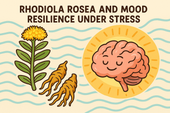
Rhodiola Rosea and Mood Resilience Under Stress
Discover how Rhodiola rosea helps your body adapt to stress 🌿. Learn how this powerful adaptogen balances cortisol, supports serotonin and dopamine, and strengthens emotional resilience — helping you stay calm, focused, and energized under pressure.
-

Chamomile and Lavender: Herbal Calm for Emotional Fluctuations
Discover how chamomile and lavender bring calm to emotional ups and downs 🌿. Learn how these two soothing herbs balance your nervous system, ease anxiety, and support restful sleep — naturally helping you find peace and emotional stability.
-
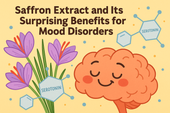
Saffron Extract and Its Surprising Benefits for Mood Disorders
Discover how saffron extract — the golden spice of joy 🌸 — can naturally support mood balance, ease anxiety, and lift mild depression. Learn what science says about its serotonin-boosting power, the ideal dosage, and how this ancient remedy compares to modern antidepressants.
-
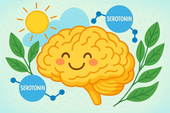
5-HTP and Serotonin: A Natural Path to Lifting Mood
Discover how 5-HTP naturally boosts serotonin 🌞 — the neurotransmitter behind mood, sleep, and emotional balance. Learn how this plant-derived compound supports happiness, reduces anxiety, and improves rest by helping your brain create more serotonin the gentle, natural way.
-
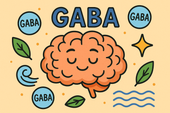
GABA Supplements for Reducing Anxiety and Mood Swings
Discover how GABA supplements can help reduce anxiety and balance mood naturally 🌿. Learn how this calming neurotransmitter works to quiet the mind, ease stress, and improve sleep — plus which nutrients and habits can boost your body’s own GABA production for long-term emotional stability.
-
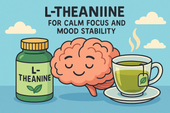
L-Theanine for Calm Focus and Mood Stability
Discover how L-theanine, the calming compound found in green tea 🍵, promotes focus, relaxation, and mood stability. Learn the science behind how it balances neurotransmitters, reduces stress hormones, and enhances clarity — helping you stay centered, calm, and productive without sedation.
-
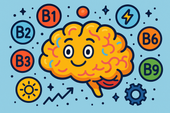
B Vitamins and Brain Chemistry: Supporting Energy and Emotional Balance
Discover how B vitamins power your brain chemistry ⚡. Learn how B6, B9, and B12 support serotonin, dopamine, and energy production — helping boost focus, mood, and emotional balance. From diet to supplements, explore how this vital nutrient group keeps your mind resilient and your energy steady.
-

N-Acetyl Cysteine (NAC) and Mood Disorders: What the Research Says
Learn how N-Acetyl Cysteine (NAC) supports brain health and mood balance 🧠. Discover how this antioxidant helps reduce oxidative stress, regulate glutamate, and improve emotional stability in depression, bipolar disorder, and anxiety — backed by cutting-edge psychiatric research.
-

Supplements for Bipolar Disorder: What May Support Stability
Discover the best supplements for bipolar disorder 🌿 that may support emotional stability and brain health. Learn how nutrients like omega-3s, magnesium, vitamin D, and NAC can help reduce inflammation, balance neurotransmitters, and complement traditional treatment safely.


















































